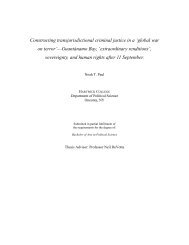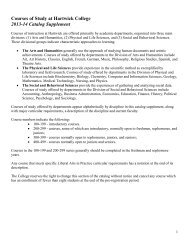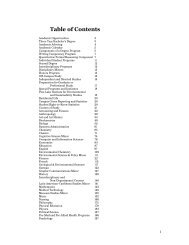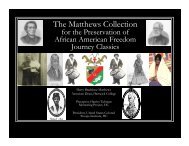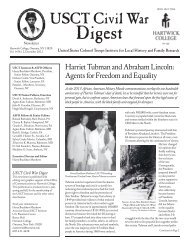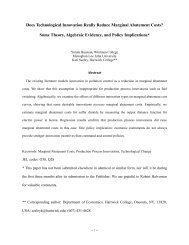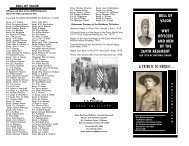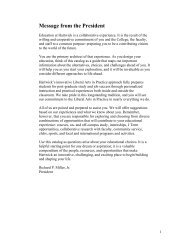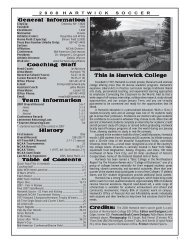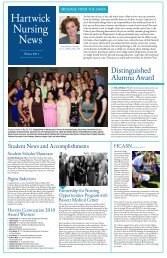Table of Contents - Hartwick College
Table of Contents - Hartwick College
Table of Contents - Hartwick College
You also want an ePaper? Increase the reach of your titles
YUMPU automatically turns print PDFs into web optimized ePapers that Google loves.
compound time and differentiating divisions <strong>of</strong> 3, 4, 6, 8 to a beat;<br />
reading rhythms with a division <strong>of</strong> 5 or 7 to a beat; the addition <strong>of</strong> I6,<br />
IV6/4, V7, V6, to chord progressions. Prerequisite: Musi 141. (CPA)<br />
150 Topics in Music (3 credits) Offered periodically in special aspects <strong>of</strong> music,<br />
such as Music and American Culture (FYS); Ebony and Ivory: White Society and<br />
the Black Musical Experience (FYS); Introduction to Indian Music; Music, Yoga<br />
and Meditation; Rock Music History and Culture; Progressive Rock.<br />
150 Electroacoustic Music Composition (3 credits) An introduction<br />
to the basic concepts and techniques <strong>of</strong> electronic music composition. The<br />
student will be introduced to the rudiments <strong>of</strong> musical acoustics, provided<br />
with “hands on” instruction on the use <strong>of</strong> pr<strong>of</strong>essional-level sequencing<br />
and digital sound-editing s<strong>of</strong>tware, and introduced to the basic techniques<br />
<strong>of</strong> recording. In addition, numerous electronic music composers and their<br />
music will be read about, listened to, and discussed. Much <strong>of</strong> the class will<br />
be devoted to a series <strong>of</strong> composition exercises and projects that are<br />
designed to explore, apply, and expand upon many <strong>of</strong> the concepts and<br />
issues presented.<br />
174 History <strong>of</strong> Radio (3 credits) “On Air: The sociological effects <strong>of</strong> radio<br />
broadcasting in America in its role as entertainer and information provider”<br />
provides an introduction to the history <strong>of</strong> radio and its powerful presence as a<br />
provider <strong>of</strong> news, information, and entertainment. Topics include: history <strong>of</strong><br />
radio broadcasting from its inception in the early part <strong>of</strong> the 1920s; important<br />
individuals involved in radio technology who became the foundation <strong>of</strong> early<br />
broadcasting; the inter-relative facets <strong>of</strong> radio, its personalities, and effects on<br />
entertainment and information with respect to historical happenings and the<br />
constantly changing tastes <strong>of</strong> the listening public; the continued importance <strong>of</strong><br />
radio in our lives; and radio’s historic role as a mirror <strong>of</strong> social change and<br />
development. (CPA)<br />
176 Rock Music History (3 credits) Surveys American history as viewed<br />
through the sound <strong>of</strong> popular music <strong>of</strong> the time. To lessen the “negative<br />
characteristics” <strong>of</strong> the blues-based genre, contemporary, conservative, and civicminded<br />
leaders renamed the emerging style “rock n’ roll.” This renaming<br />
somewhat allowed for the distribution <strong>of</strong> this musical style over the public<br />
airwaves, in movie theatres, in the privacy <strong>of</strong> teen bedrooms and on the new<br />
portable transistor radios. Contemporary society, though, was still aggressive in<br />
its attempt to lessen (and in some cases eliminate) the popularity and persuasive<br />
power <strong>of</strong> this music and blamed its negative attraction to white teen audiences on<br />
influential Afro-American performers. This musical style therefore is co-existent<br />
with social precepts <strong>of</strong> the time and allowed for a broad, though irrational view <strong>of</strong><br />
the interaction <strong>of</strong> races and their individualistic cultures. The music <strong>of</strong> this time<br />
period, although composed <strong>of</strong> styles from previous popular genres <strong>of</strong> the ’30s and<br />
’40s, became the representative <strong>of</strong> teen rebellion and the need for social and<br />
personal change, for many ages. (CPA)<br />
217 Golden Prague (4 credits) (J Term abroad) (Same as History 217)<br />
Based in Prague, the Czech Republic, this course examines the transitions<br />
from its Imperial to the independent and democratic nationhood, and<br />
through its Marxist past into the democratic present. Students will survey<br />
history and politics <strong>of</strong> this vibrant cultural city as they relate to the arts,<br />
music and culture in general. Several trips will take students into the<br />
countryside <strong>of</strong> the Czech Republic, and abroad to places such as<br />
Auschwitz (Poland) and Salzburg (Austria). Many visits to the musical<br />
171



